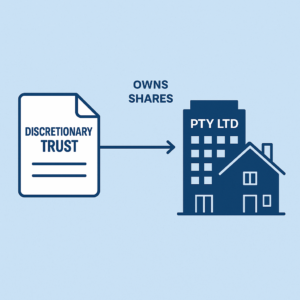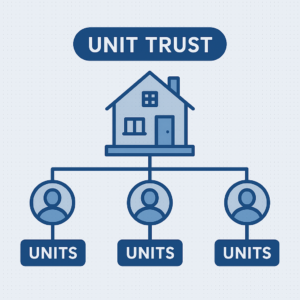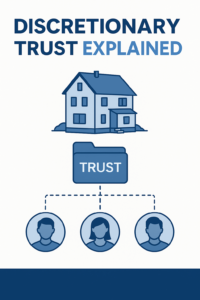Discretionary Trust Business Structure in Australia
A discretionary trust, often called a family trust, is a common business structure in Australia that allows income, profits, and assets to be held by a trustee on behalf of a group of beneficiaries.
What makes this structure “discretionary” is that the trustee decides who receives the income or profits from the business and how much each beneficiary gets. This flexibility makes discretionary trusts a popular choice for family-owned businesses, investment ventures, and small enterprises that want to manage tax and protect assets effectively.
What a Discretionary Trust Means
A discretionary trust is not a separate legal entity like a company. Instead, it’s a legal arrangement created by a trust deed — a document that sets out how the trust operates, who the beneficiaries are, and what powers the trustee has.
The trustee (which can be an individual or a company) is responsible for:
-
Managing the business or assets held by the trust
-
Meeting all legal and tax obligations
-
Deciding how profits are distributed among beneficiaries
Because the beneficiaries don’t directly own the assets, they generally receive asset protection — a major advantage of this structure.
Advantages
✅ Tax Flexibility
Income can be distributed to beneficiaries in a way that reduces the group’s overall tax liability.
✅ Asset Protection
Assets are owned by the trust, not individuals, which can help protect them from personal creditors or legal claims.
✅ Capital Gains Tax Discount
Trusts may receive a 50% capital gains discount when selling assets held for more than 12 months.
✅ Estate Planning Benefits
Control of the trust can be passed on without transferring ownership of the assets themselves.
✅ Professional Credibility
A trust structure often appears more established to lenders, investors, and clients.
Disadvantages
⚠️ Setup and Ongoing Costs
Establishing a trust requires a legally drafted deed and professional advice, with annual accounting and compliance costs.
⚠️ Complex Administration
Trustees must maintain records, lodge annual tax returns, and prepare distribution resolutions each year.
⚠️ Undistributed Income Taxed at High Rates
If profits aren’t distributed to beneficiaries by 30 June, the trust may be taxed at the highest marginal rate.
⚠️ Losses Stay in the Trust
Losses generally can’t be distributed to beneficiaries — they’re trapped within the trust.
When a Discretionary Trust Is Suitable
A discretionary trust is often used when:
-
A family runs a business or investment portfolio together
-
The business has valuable assets or intellectual property to protect
-
There are multiple people involved, and flexibility in income distribution is needed
-
Long-term wealth building and estate planning are priorities
It’s generally less suitable for sole operators or startups that want a low-cost, simple structure.
Key Obligations
To operate a discretionary trust as a business, you’ll need to:
-
Have a trust deed prepared by a legal professional
-
Appoint a trustee (often a company) and an appointor
-
Register for an ABN and Tax File Number (TFN)
-
Register for GST if turnover exceeds $75,000
-
Keep clear financial records and lodge annual trust tax returns
Trustify Tip: Using a corporate trustee can provide stronger asset protection and make future management easier.
Summary
A discretionary trust is a flexible and effective business structure that can help manage income, reduce tax, and protect assets — particularly for families or small groups in business together.
While it offers powerful benefits, it comes with added complexity, costs, and compliance responsibilities.
Information current as of October 2025. Reviewed by the Trustify Business Advisory Team. General information only — not financial or legal advice.
Others
-
October 20, 2025 Buying Property Under Your Personal Name in Australia: Pros and Cons
-
October 18, 2025 Service Trust Business Structure in Australia




